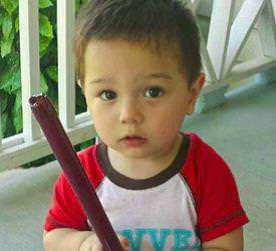Burned Babies and the Militarization of American Policing

In a Salon essay published today, Alecia Phonesavanh recalls the night her 19-month-old son, Bounkham (a.k.a. Bou Bou), was horribly injured by a flash-bang grenade tossed into his crib during a fruitless drug raid in Habersham County, Georgia. "It's been three weeks since the flashbang exploded next to my sleeping baby," she writes, "and he's still covered in burns. There's still a hole in his chest that exposes his ribs. At least that's what I've been told; I'm afraid to look."
Phonesavanh argues that the SWAT team, which consisted of Harbersham County sheriff's deputies and Cornelia police officers, should have known there were children in the house, where she and her family were staying with relatives after a fire destroyed their home in Wisconsin. "Some of my kids' toys were in the front yard," she says, and on their way into the house, the officers passed a minivan with child seats inside and stickers on the back window representing "a dad, a mom, three young girls, and one baby boy." The family's lawyer likewise has noted that even rudimentary surveillance of the house should have discovered evidence of children. Police, who were looking for the Phonesavanhs' 30-year-old nephew, Wanis Thonetheva, seem to have relied on the assurances of an undercover agent who visited only briefly and did not enter the house.
So that is one possible lesson to draw from this appalling incident: Before tossing explosive, incendiary devices into the homes they attack in the middle of the night, police should do more to verify that no children are present. But Phonesavanh also suggests that police too readily resort to paramilitary assaults that put innocent people, adults as well as children, at risk:
Flashbang grenades were created for soldiers to use during battle. When they explode, the noise is so loud and the flash is so bright that anyone close by is temporarily blinded and deafened….
My husband's nephew, the one they were looking for, wasn't there. He doesn't even live in that house. After breaking down the door, throwing my husband to the ground, and screaming at my children, the officers—armed with M16s—filed through the house like they were playing war. They searched for drugs and never found any.
As a new report from the American Civil Liberties Union (ACLU) documents, this sort of disproportionate response is common when police serve drug warrants. SWAT teams, originally intended for special situations involving hostages, active shooters, or riots, today are routinely used to execute drug searches. Examining a sample of more than 800 SWAT deployments by 20 law enforcement agencies in 2011 and 2012, the ACLU found that 79 percent involved searches, typically for drugs. Research by Eastern Kentucky University criminologist Peter Kraska has yielded similar numbers.
These operations are inherently dangerous, especially since armed men breaking into a house while the occupants are sleeping can easily be mistaken for burglars, with deadly consequences for cops, occupants, or both. Even when no one dies or suffers serious injuries, SWAT raids feature the destruction of property (starting with broken doors and smashed windows), the manhandling and detention of innocent people, and the more-than-occasional killing of beloved family pets. All things to be avoided, you might think, unless absolutely necessary.
Police typically justify no-knock raids and heavy firepower by claiming the target is apt to be armed. That is what they said about Thonetheva, the Phonesavanhs' nephew, who had no weapons when he was arrested at a different location on the day of the raid that sent Bou Bou to the hospital. (There also were no weapons in his parents' house, where the Phonesavanhs were staying.) In the ACLU's sample that sort of outcome was common: In at least one-third of cases where a weapon was believed to be present, none was found. Police records indicated recovery of a weapon in one out of three such cases. In the rest, the records did not address that point.
The ACLU, like my former Reason colleague Radley Balko, argues that the militarization of American policing has resulted from an excessively literal understanding of the War on Drugs, training that encourages cops to "adopt a 'warrior' mentality and think of the people they are supposed to serve as enemies," and the Pentagon's promiscuous sharing of equipment with local police departments, which explains why no town is too little or quiet for an armored personnel carrier. The report recommends specific local, state, and federal reforms aimed at reversing this trend, including greater transparency, better record keeping, stricter standards for SWAT deployments, statutes requiring the suppression of evidence gathered in violation of the knock-and-announce rule, and an end to the sharing of military equipment.
The ACLU mentions declining public support for the War on Drugs as one reason to reconsider the ferocity with which it is waged. But while de-escalation would be welcome, it does not address the fundamental immorality of responding to peaceful transactions with guns and handcuffs. Even if reforms like those recommended by the ACLU encourage police to be more judicious in their use of force, unjustifiable violence will always be a defining feature of drug prohibition.
